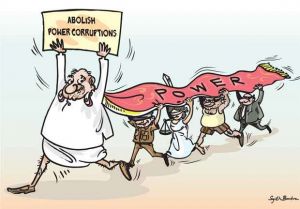Representative
It is well documented that power corrupts[1][2][3][4][5][6]. People often start with good intentions but end up swayed by the lure of self gain provided by big industry and bad science.
This is nothing new, Lord Acton in 1857 said “Power tends to corrupt and absolute power corrupts absolutely. Great men are almost always bad men, even when they exercise influence and not authority; still more when you superadd the tendency of the certainty of corruption by authority." Paradoxically those that are aware of the corrupting nature of power (Figure 1) often run to be a representative on this basis only for them to prove themselves right when they get into power.
This as a problem in human nature. We cannot get rid of representatives so we should fix this problem before it starts. By enforcing complete transparency of those given the privilege of power these issues might be avoided.
References
- ↑ Controlling others and controlling oneself: Social power and emotion suppression. Katerina Petkanopoulou, Guillermo B. Willis, Rosa Rodríguez-Bailón. (2012) Revista de Psicología Social 27:3, pages 305-316.
- ↑ Power that Builds Others and Power that Breaks: Effects of Power and Humility on Altruism and Incivility in Female Employees. David J. Yoon, Steven M. Farmer. (2018) The Journal of Psychology 152:1, pages 1-24.
- ↑ Higher social class predicts increased unethical behavior. Paul K. Piff, Daniel M. Stancato, Stéphane Côté, +1 , Rodolfo Mendoza-Denton, and Dacher Keltner-1Authors Info & Affiliations Edited* by Richard E. Nisbett, University of Michigan, Ann Arbor, MI, and approved January 26, 2012 (received for review November 8, 2011) February 27, 2012 109 (11) 4086-4091 https://doi.org/10.1073/pnas.1118373109
- ↑ “Fear of losing power corrupts those who wield it”: the combined effects of leader fear of losing power and competitive climate on leader self-serving behavior. Barbara Wisse, Diana Rus, Anita C. Keller, Ed Sleebos. (2019) European. Journal of Work and Organizational Psychology 28:6, pages 742-755.
- ↑ Power Changes How the Brain Responds to Others. July 2013. Journal of Experimental Psychology General 143(2) DOI:10.1037/a0033477. SourcePubMed
- ↑ Behaviour variability and the Situated Focus Theory of Power. Ana Guinote, Pages 256-295 | Published online: 22 Jul 2010 https://doi.org/10.1080/10463280701692813
